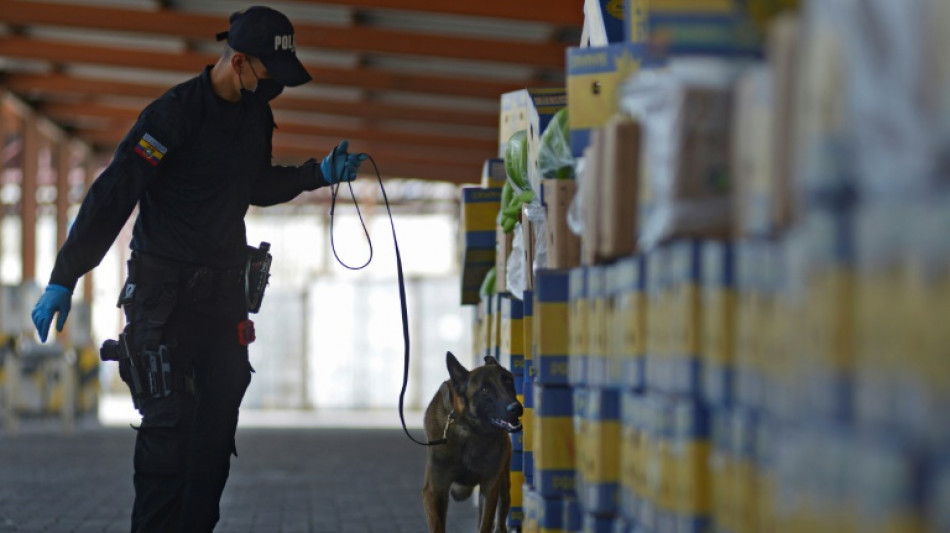
-
 Chargers, Bills edge closer to playoff berths
Chargers, Bills edge closer to playoff berths
-
Gang members given hundred-years-long sentences in El Salvador

-
 Hosts Morocco off to winning start at Africa Cup of Nations
Hosts Morocco off to winning start at Africa Cup of Nations
-
No jacket required for Emery as Villa dream of title glory

-
 Amorim fears United captain Fernandes will be out 'a while'
Amorim fears United captain Fernandes will be out 'a while'
-
Nigerian government frees 130 kidnapped Catholic schoolchildren

-
 Captain Kane helps undermanned Bayern go nine clear in Bundesliga
Captain Kane helps undermanned Bayern go nine clear in Bundesliga
-
Captain Kane helps undermanned Bayern go nine clear

-
 Rogers stars as Villa beat Man Utd to boost title bid
Rogers stars as Villa beat Man Utd to boost title bid
-
Barca strengthen Liga lead at Villarreal, Atletico go third

-
 Third 'Avatar' film soars to top in N. American box office debut
Third 'Avatar' film soars to top in N. American box office debut
-
Third day of Ukraine settlement talks to begin in Miami

-
 Barcelona's Raphinha, Yamal strike in Villarreal win
Barcelona's Raphinha, Yamal strike in Villarreal win
-
Macron, on UAE visit, announces new French aircraft carrier

-
 Barca's Raphinha, Yamal strike in Villarreal win
Barca's Raphinha, Yamal strike in Villarreal win
-
Gunmen kill 9, wound 10 in South Africa bar attack

-
 Allegations of new cover-up over Epstein files
Allegations of new cover-up over Epstein files
-
Atletico go third with comfortable win at Girona

-
 Schwarz breaks World Cup duck with Alta Badia giant slalom victory
Schwarz breaks World Cup duck with Alta Badia giant slalom victory
-
Salah unaffected by Liverpool turmoil ahead of AFCON opener - Egypt coach

-
 Goggia eases her pain with World Cup super-G win as Vonn takes third
Goggia eases her pain with World Cup super-G win as Vonn takes third
-
Goggia wins World Cup super-G as Vonn takes third

-
 Cambodia says Thai border clashes displace over half a million
Cambodia says Thai border clashes displace over half a million
-
Kremlin denies three-way US-Ukraine-Russia talks in preparation

-
 Williamson says 'series by series' call on New Zealand Test future
Williamson says 'series by series' call on New Zealand Test future
-
Taiwan police rule out 'terrorism' in metro stabbing

-
 Australia falls silent, lights candles for Bondi Beach shooting victims
Australia falls silent, lights candles for Bondi Beach shooting victims
-
DR Congo's amputees bear scars of years of conflict

-
 Venison butts beef off menus at UK venues
Venison butts beef off menus at UK venues
-
Cummins, Lyon doubts for Melbourne after 'hugely satsfying' Ashes

-
 'It sucks': Stokes vows England will bounce back after losing Ashes
'It sucks': Stokes vows England will bounce back after losing Ashes
-
Australia probes security services after Bondi Beach attack

-
 West Indies need 462 to win after Conway's historic century
West Indies need 462 to win after Conway's historic century
-
Thai border clashes displace over half a million in Cambodia

-
 Australia beat England by 82 runs to win third Test and retain Ashes
Australia beat England by 82 runs to win third Test and retain Ashes
-
China's rare earths El Dorado gives strategic edge

-
 Japan footballer 'King Kazu' to play on at the age of 58
Japan footballer 'King Kazu' to play on at the age of 58
-
New Zealand's Conway joins elite club with century, double ton in same Test

-
 Australian PM orders police, intelligence review after Bondi attack
Australian PM orders police, intelligence review after Bondi attack
-
Durant shines as Rockets avenge Nuggets loss

-
 Pressure on Morocco to deliver as Africa Cup of Nations kicks off
Pressure on Morocco to deliver as Africa Cup of Nations kicks off
-
Australia remove Smith as England still need 126 to keep Ashes alive

-
 Myanmar mystics divine future after ill-augured election
Myanmar mystics divine future after ill-augured election
-
From the Andes to Darfur: Colombians lured to Sudan's killing fields

-
 Eagles win division as Commanders clash descends into brawl
Eagles win division as Commanders clash descends into brawl
-
US again seizes oil tanker off coast of Venezuela

-
 New Zealand 35-0, lead by 190, after racing through West Indies tail
New Zealand 35-0, lead by 190, after racing through West Indies tail
-
How Can Gum Disease Lead to Tooth Loss in Kyle, TX?

-
 West Indies 420 all out to trail New Zealand by 155
West Indies 420 all out to trail New Zealand by 155
-
Arteta tells leaders Arsenal to 'learn' while winning


Hidden in bananas and tea, cocaine departs Ecuador port by the ton
Trying to prevent drug traffickers from hiding cocaine in cargo containers at Ecuador's main port of Guayaquil is becoming an increasingly expensive headache for police and exporters alike.
The ingenuity of criminal gangs means tons of cocaine leave the port hidden in food containers.
Surrounded by a poor neighborhood, the Guayaquil port is a hive of activity, where trained dogs sniff here and there while police officers cut into bananas, pineapples and even tea drums looking for drugs.
Customs agents in Guayaquil manually check a fifth of the containers to ensure that export companies are not a front for the mafia.
Two German Shepherds, Wolf and Jessi, help the officers but they can only work for 10 minutes at a time to be effective.
"We can't tire them out too much, otherwise we won't find any drugs," Richard Riera, head of the National Police Ports and Airports Information Unit, told AFP.
Thanks to the dogs, liquid drugs hidden by traffickers inside tea drums were recently detected after passing through the scanner without incident.
- 'Titanic task' -
Drug traffickers "prefer the port because this is where the majority of exports to Europe and the United States leave," said Riera.
Situated between Colombia and Peru -- the world's two largest producers of cocaine -- Ecuador seized a record 210 tons of the powder in 2021, of which 96 tons were discovered in Guayaquil.
A third of seizures were destined for Europe while another 11 percent were headed for the United States, according to the police.
"Our country ceased being a collection center to become instead a platform for drug distribution on an international scale," said national anti-narcotics chief Giovanni Ponce.
Drug related violence is increasing in surrounding Guayas state where 78 percent of 404 murders so far this year were linked to drug trafficking, Ponce told the Teleamazonas news channel.
Outside the port, in the city's streets, organized crime keeps the local population in a state of terror with bodies decapitated or hanging from bridges.
In the first quarter of this year, police seized 15.8 tons of drugs in Guayaquil port alone, four times more than in the same period of 2021.
But checking 2.4 million containers a year "is a titanic task," said Riera.
The port has 12 privately owned terminals and handles 85 percent of Ecuador's non-oil exports -- around 25 million metric tons of produce a year.
Officials say they need more security guards and more unintrusive scanners that don't damage bananas and shrimp, the country's flagship exports, but there is only one of these in the whole of Ecuador.
- Huge cost to exporters -
Exporters have been left frustrated by the number of containers being infiltrated with drugs.
Criminal gangs break the locks, take out the legal cargo and replace it with cocaine bricks.
"Often they go all the way to the point of origin" in the factory, said Javier Lancha de Micheo, owner of the private Contecon terminal.
The company has had to install security cameras in the terminal and introduce security checks on people and vehicles entering the premises.
The worst affected are banana exports.
Those containers are often breached on the roadside as well as in the port itself.
"We're the main victims because we move 7,000 banana containers a week," said Richard Salazar, executive director of the Banana Marketing and Export Association.
Companies spend $200 per container on security measures such as satellite surveillance and private contractors.
But whenever drugs are discovered, authorities seize the entire container as evidence, to the detriment of its owners.
"No one takes responsibility for the loss. Each container is worth $12,000," added Salazar, who says the industry has pleaded for help.
"We have asked for and demanded an integrated security policy in Ecuador... as an additional option to the private efforts that every exporter is already carrying out."
H.E.Young--AMWN